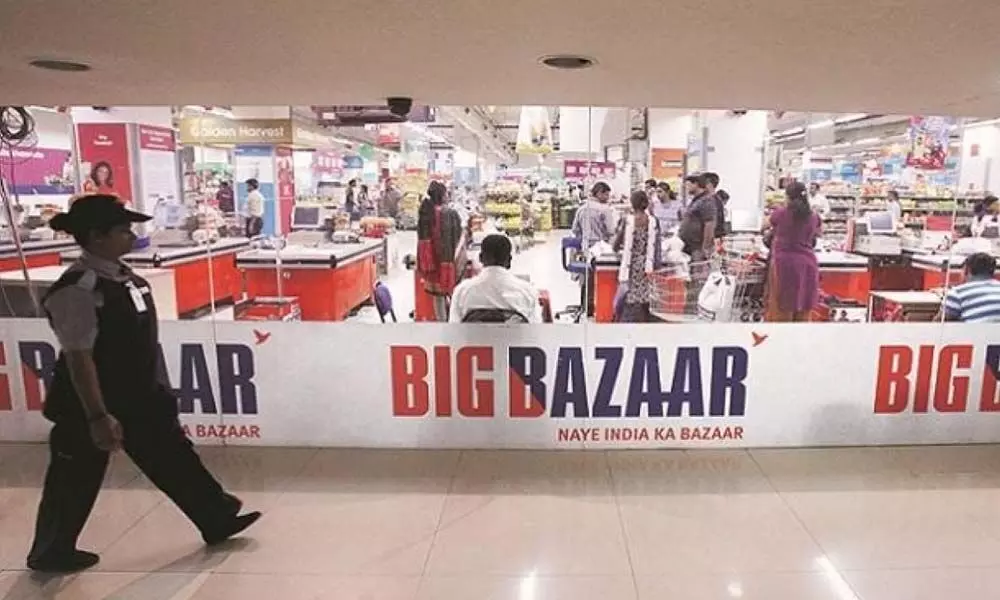Will legal tangle kill Future Group?
It’s going to be the end of the road for Vodafone Idea as well because Centre unlikely to come to its rescue
image for illustrative purpose

Last week, India witnessed three key developments related to business, trade and industry - legislative efforts to do away with what is now popular as retrospective taxation in India, the Supreme Court ruling in favour of Amazon in a case related to the acquisition of retail major Future Group by the Reliance Group, and last but not the least, Kumar Mangalam Birla's resignation as non-executive chairman of Vodafone Idea.
Let's delve on each of the three developments, starting with the retrospective taxation. The Narendra Modi government had finally acted on the controversial tax by getting a legislation cleared in Lok Sabha last week to abolish the regressive tax practice which was termed by many global investors as 'tax terrorism'. In 2012, the then Congress-led UPA government brought in amendments to the Income Tax Act-1961, aiming at taxing the capital gains that an overseas company made by selling its shares which directly or indirectly derived their value from the company's Indian assets. This law, made with retrospective effect, imposed staggering amounts of tax liability on multinational majors like Vodafone Group and Cairn Energy which had operations in India. While UK-based Cairn Energy Plc was asked to cough up more than Rs 30,700 crore in tax and penalties for transferring the ownership of its Indian oilfield to Cairn India, Vodafone Group Plc, a UK-based telecom giant, faced a tax demand of over Rs 22,000 crore for acquiring a stake owned by a Cayman Islands-based investment firm in an Indian telecom operator way back in 2007. The Centre even confiscated assets of Cairn Energy worth $1.5 billion. It will now have to refund the amount post the new legislation.
The Modi government's swift move, which will obviously send positive signals to the global investors, will also provide a big relief to Vodafone though the latter had not paid any amount towards the tax liability. However, the problems of Vodafone Idea, in which Vodafone Group has 41 per cent stake, are still far from over as it has been incurring huge losses owing to intense competition in the telecom sector unleashed by Mukesh Ambani-led Reliance Jio. Kumar Mangalam Birla, the head of Aditya Birla Group, which owns stake in the ailing telecom operator, reportedly threw up his hands in despair and offered his stake free to the central government. The Birla scion recently resigned as Vodafone Idea's non-executive chairman as well. It is said that even Vodafone Group has expressed its willingness to forego its stake in favour of the Indian government if the latter merges the ailing telecom operator with state-run telecom operator BSNL.
But the reality is different. I don't think the Modi government will come to the rescue of Vodafone Idea, which is facing a liability burden of over Rs 1.8 lakh crore, at a time when it is gearing up to sell several public-sector units (PSUs) owned by it. Further, the central government has so far failed to find a way out for the ailing Air India, the white elephant of India's airline industry that it owns. Moreover, BSNL is also struggling financially. Then expecting the Modi government to save Vodafone Idea is far-fetched. Vodafone Group is a global telecom major with a presence in over 22 countries and enjoys a total asset base of 168 billion euros (over Rs 14.66 lakh crore). Kumar Mangalam Birla is also a multi-billionaire in his own right. When they can't help their own company, how can the Indian government do that? So, it's the end of the road for Vodafone India unless a miracle happens. But the failure of Vodafone Idea once again proves that India is not a place for global telecom operators. Etisalat, Telenor, Hutch and the list of failures goes on and on. And Vodafone will soon join this not so coveted list.
The last week's third major development was the Supreme Court's ruling in favour of e-commerce major Amazon in the case related to the acquisition of Future Group by Reliance Retail. In August last year, Reliance Retail Ventures Limited announced Rs 24,713-crore ($3.4 billion) deal to buy out Kishore Biyani-owned Future Group which was badly hit by the ongoing Covid crisis. Though most of the Indian regulators cleared the deal, it got stuck when global e-commerce giant Amazon dragged Future Group to arbitration in Singapore and got a ruling against the acquisition deal. In 2019, Amazon bought a stake in Future Coupons with an option to buy stake in Future Retail at a later. Though the Delhi High Court stayed the arbitration award, the Supreme Court last week gave a verdict in favour of the e-commerce giant.
Future Group, which is reeling under a debt burden of Rs 20,742 crore, incurred a loss of Rs 5,943 crore in FY21 with its flagship retail operations taking a toll in excess of Rs 3,000 crore. If the retail major doesn't get financial help faster, it may hit a dead end. However, given the legal tangles the group has currently got itself entangled in, it is very unlikely that any helping hand will reach the retail giant in near future. The ongoing battle between Mukesh Ambani, the world's 12th richest person, and Amazon's Jeff Bezos, the world's richest person, for Future Group reveals the intense competition for dominance in India's fast-growing retail market, which is now valued at over a trillion dollars, but lives of over 50,000 employees and future of 6,000 small and medium vendors will be at stake if Future Group goes bust.

